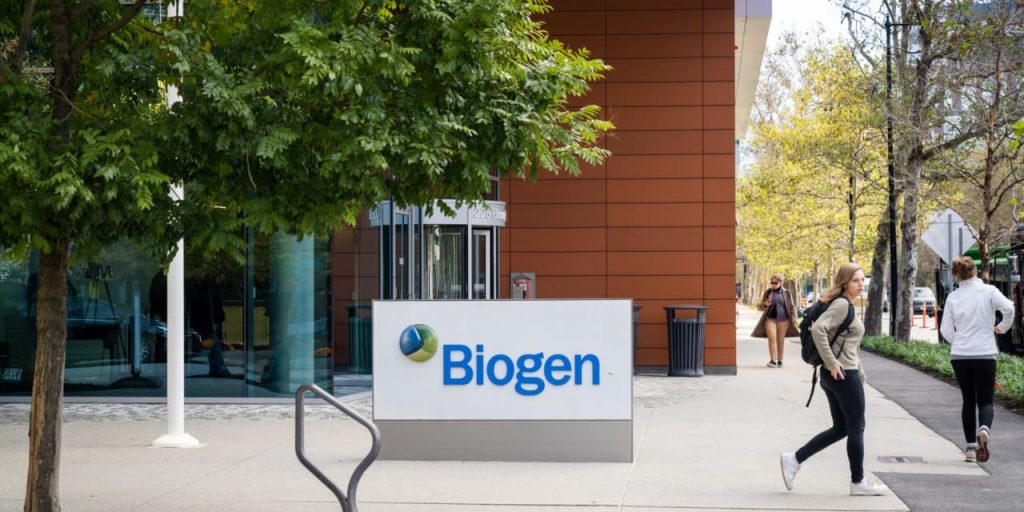Biogen
reported earnings Wednesday that beat Wall Street expectations, but even CEO Christopher Viehbacher acknowledged that investors weren’t focused on the numbers.
“The Street isn’t really thinking about the results that we’re achieving today,” Viehbacher said on an early morning call for reporters. “They’re really thinking about, where’s
Biogen
going? And when does it return to growth?”
The third-quarter earnings report didn’t offer any firm answers on those questions, which will hinge on the rollout of the Alzheimer’s drug Leqembi, and on Biogen’s own cost-cutting programs.
The stock climbed 1.1% in premarket trading. Biogen shares have fallen 11.3% this year as of the close of the market on Tuesday, and analysts expect the company’s earnings per share to be roughly half this year what they were as recently as 2020.
Asked on the press call when Biogen believes it will start to grow sales and profits again, Viehbacher said the company would offer longer-term guidance when the company reports fourth-quarter earnings in February.
Biogen reported revenue for the third quarter of $2.5 billion, slightly above the $2.4 billion estimate of analysts surveyed by FactSet. Non-GAAP earnings were $4.36 a share in the quarter, better than the $3.97 consensus estimate.
Biogen
also raised its sales guidance for the full year, but trimmed its earnings guidance. The company said it had previously expected a “mid-single digit percentage decline” in total revenue in 2023 from to prior year, but now says it only expects a “low-single digit percentage decline.”
On full-year earnings, however, the company said it anticipates non-GAAP earnings of between $14.50 and $15 a share, down from its earlier guidance of between $15 and $16. The company said that adjustment reflects a dilution of roughly 75 cents a share related to its recently closed acquisition of the biotech Reata Pharmaceuticals.
Focus for Biogen in recent months has been on Leqembi, with which it has partnered with
Eisai
(ESAIY), and on a newly approved postpartum depression treatment called Zurzuvae, on which Biogen is partnered with
Sage Therapeutics
(SAGE).
There’s not much mystery around the trajectory of Biogen’s older products, sales of which are flat or dropping. Sales of its multiple sclerosis products were $1.2 billion in the third quarter, down 12% on a constant currency basis from the same quarter last year. Sales of its spinal muscular atrophy drug Spinraza were $448 million, up 7% on a constant currency basis.
Total revenue for the quarter was up 3% on a constant currency basis.
The company said that third quarter, in-market revenue for Leqembi was approximately $2 million as recorded by Eisai. When Eisai reported those results Tuesday, the company’s American depositary receipts fell 3.9%.
Leqembi sales were lower than some had anticipated, but analysts wrote that sales growth would bree slow for Leqembi. “Today’s numbers shouldn’t come as a surprise,” Jefferies analyst Michael Yee wrote Tuesday of the Eisai results. “Eisai is making steady progress on the launch with more prescribers and hospital networks on board, but it will take time for sales to grow.”
On the press call Wednesday, Biogen’s Viehbacher said that the pace of the Leqembi rollout was hard to predict. “There’s an awful lot of work going on, we see a lot of progress on that,” he said. “Sales will be expected to ramp at some point. But it has always been a difficult product to forecast, because there’s just no real good analogs here.”
Also on Tuesday, Biogen partner
Sage Therapeutics
(SAGE) had said that it would price Zurzuvae at $15,900 for a two-week treatment course. Leerink Partners analyst Marc Goodman wrote that the price was lower than expected, and shares of Sage fell 4.8%.
Biogen and Sage had been hoping for FDA approval of Zurzuvae to treat major depressive disorder, which would have made for a much larger market opportunity, but only received approval in postpartum depression.
Viehbacher said that Biogen remained committed to the partnership with Sage. “We actually think that we can really help support Sage in this launch, and at the same time really address a significant unmet need,” he said. “It’s clearly not the opportunity that [major depressive disorder] would have been. But I think it’s still will be a medium sized product.”
Biogen shares have declined more than 35% since early June 2021—when shares spiked on excitement over Food and Drug Administration approval of the Alzheimer’s drug Aduhelm, which has since proved to be essentially a commercial failure.
In late October, Eisai said a new version of Leqembi that is injected under the skin cleared 14% more of the amyloid brain plaques thought to be associated with Alzheimer’s disease than the currently approved medicine, which is administered via intravenous infusion. Rates of the condition known as ARIA—a potentially dangerous brain swelling—were slightly higher in patients who received the subcutaneous version, but Eisai said that the sample size was too small for exact comparisons to be made.
Eisai expects to file for approval of the subcutaneous version of Leqembi by March of 2024.
Biogen in July announced a cost-cutting program that it said would reduce its head count by 1,000 people, and save $700 million in net operating expenses.
“We go after these hard to solve medical problems,” Viehbacher said early Wednesday. “Our industry needs companies like Biogen. And so how do we find the right balance here between really making sure that we survive and grow as a company, but to not really lose that ethos, which is at the heart of Biogen?”
Write to Josh Nathan-Kazis at josh.nathan-kazis@barrons.com
Read the full article here




